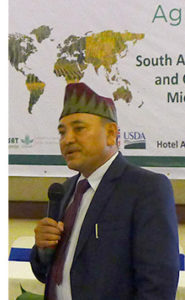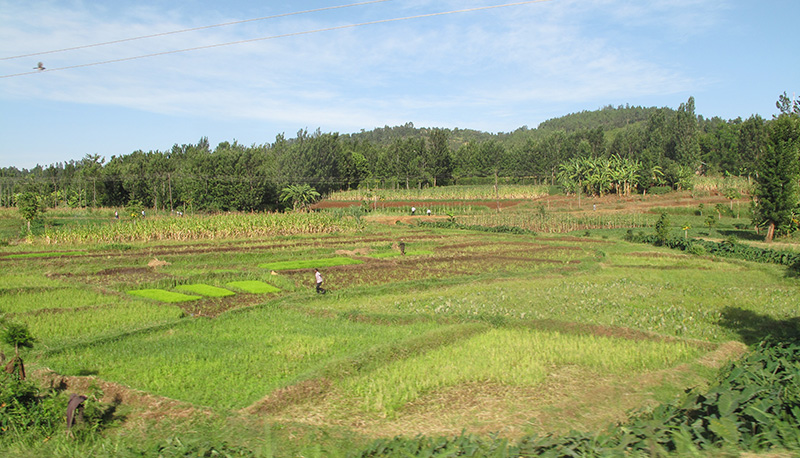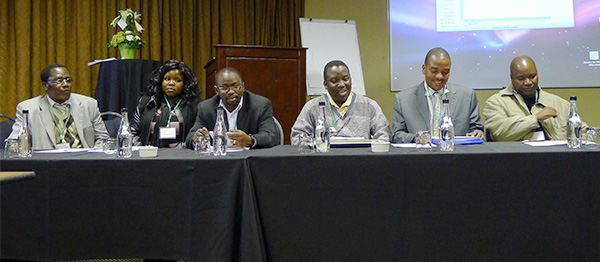By: Shari Lifson

Yubak Dhoj G.C., Director General of the Department of Environment in Nepal addresses researchers in Kathmandu.
Throughout the world, communities dependent on agricultural systems are vulnerable to food insecurity. Each agricultural system is associated with a unique set of environmental and economic conditions and changes in those conditions could affect the future stability of crops and livestock. AgMIP regional research teams in Sub-Saharan Africa and South Asia are engaging policymakers, agricultural ministers, extension agents, and farmers – those who best understand the regional conditions – in order to better understand together how changing climate and other factors may affect agricultural systems and food security. AgMIP researchers in Latin America and East Asia are in the process of establishing similar studies in their regions.
Collaboration with stakeholders enables the AgMIP research teams to develop Representative Agricultural Pathways (RAPs) for their study regions. The RAPs are economic and social development narratives that include agricultural technology trends, prices and costs of production trends, and agriculture and conservation policy. They are best developed with multidisciplinary teams of researchers and stakeholders with diverse expert knowledge, interests and experience with agricultural systems. Once developed, RAPs can be incorporated in studies that integrate climate, crop and economic models to assess plausible outcomes.
Stephen King’uyu, Agriculture Deputy Director (Adaptation & Mitigation), Climate Change Secretariat from Kenya, is a stakeholder who has been advising the AgMIP East Africa Regional Research Team. His responsibilities include adoption of protocols related to climate change adaptation and mitigation and formulation of the national policy. He recently attended an AgMIP workshop in Pretoria, South Africa where he shared his experience and knowledge with AgMIP researchers working in regions of Sub-Saharan Africa.

Farmland in Kenya.
“Agriculture faces multiple challenges in Kenya related to climate change,” explained King’uyu, “issues related to increased variability of rainfall, increased temperatures which will increase evapotranspiration rates reducing soil moisture required for crop development, and reduced agricultural productivity. Socio-economic issues include increased or unstable fertilizer prices and other farm inputs.”
King’uyu continued, “I think there are lots and lots of good things that are likely to come out of this partnership with AgMIP. We know what issues are impacting on the farmers and their operations, and ideally that creates a baseline for further work.”
Dumisani Mbikwa Nyoni is Provincial Agricultural Extension officer in the Department of Agricultural Technical and Extension Services in Zimbabwe where he works with farmers in the promotion of conservation agriculture to address climate change challenges. At the Pretoria workshop he commented on some of the difficulties agriculture in his country is facing, “In the case of Zimbabwe, close to 80% of the population sustains it livelihood from rain-fed agriculture, and we have been witnessing an increase in the number of mid-season dry spells, a shortening of the season length, and increases in the rate of crop failure and an increase in the number of droughts as well, which results in complete crop failure and livestock losses.”
Some of the adaptation methods that Nyoni feels would assist farmers are new seed varieties for the shorter season length and drought resilience, and options for farmers to intensify production in smaller areas to produce feed for livestock during dry periods.

Stakeholders at the Sub-Saharan Mid-Term Workshop Pretoria, South Africa.
At a recent AgMIP Workshop in Kathmandu, Nepal, Yubak Dhoj G.C., Director General of the Department of Environment in Nepal, met with AgMIP researchers working on agricultural systems in the Indo-Gangetic Basin. Dhoj G.C.’s work at the Department of Environment includes implementation of environmental friendly agriculture, pesticides, affluent and waste disposals.
“Nepal has been facing many challenges with climate change and the recent phenomenon in the environment,” Dhoj G.C. noted. “Nepal is one of the poorest countries in the world and we have major hits with these changes and we don’t have that much in [the way of] coping strategies and adaptation measures. Our country will benefit from outcomes developed in the region.”
Through the RAPs process, these and other participating stakeholders contribute essential inputs to policy-informed research investigations using a method AgMIP calls “Integrated Regional Assessment.” The exploration of a range of RAPs provides policy makers more robust considerations of possible shifts in local or regional food security in the years ahead.
Stephen King’uyu commented on how he would use AgMIP research, “Ideally research will provide evidence for policy formulation; every good policy maker would want to think about evidence-based policy.”

33,002 Comments